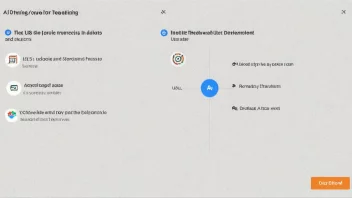In an age where data is considered the new oil, understanding the privacy implications of data aggregation has become increasingly crucial. Data aggregation involves the collection and compilation of information from various sources, which can provide valuable insights but also raise significant privacy concerns.
Data aggregation can be utilized in numerous fields, from marketing to healthcare. For instance, businesses aggregate consumer data to tailor products and services more effectively, while healthcare providers may compile patient data to enhance treatment protocols. However, this practice can lead to unintended consequences, particularly regarding individual privacy.
One of the primary privacy concerns is the potential for misuse of aggregated data. Once data is collected and anonymized, it may still be susceptible to re-identification through advanced analytical techniques. This means that seemingly harmless datasets, when combined with other information, could lead to the identification of individuals. For example, a dataset that includes ZIP codes, birth dates, and gender may not directly identify someone, but when cross-referenced with other public datasets, it could easily lead to the identification of specific individuals.
Another significant issue is consent. Many consumers are often unaware of how their data is being aggregated and used. Companies may obtain consent through lengthy terms and conditions, which most users do not read. This lack of transparency can result in ethical dilemmas and may lead to a breach of trust between consumers and companies. It’s essential for organizations to implement clear data usage policies and ensure that users understand what they are consenting to.
Moreover, the aggregation of data can lead to bias and discrimination. Algorithms that analyze aggregated data can unintentionally reinforce existing stereotypes or biases if the underlying data reflects societal inequalities. For example, if a company uses historical data to make hiring decisions, it may inadvertently discriminate against certain groups if those groups were historically underrepresented in the dataset. Thus, it is crucial to critically assess the data used for aggregation and ensure it represents a fair cross-section of the population.
To mitigate these privacy concerns, organizations must prioritize data protection and transparency. Implementing robust data governance frameworks can help ensure that data is collected, stored, and utilized responsibly. Additionally, employing privacy-enhancing technologies, such as differential privacy, can enable companies to extract insights from aggregated data without compromising individual privacy.
In conclusion, while data aggregation can offer significant benefits, it is accompanied by various privacy implications that cannot be overlooked. Organizations must recognize the importance of ethical data practices, transparency, and user consent to build trust and protect individual privacy. As we continue to navigate the complexities of data in our digital age, prioritizing privacy will be essential for sustainable growth and societal trust.






